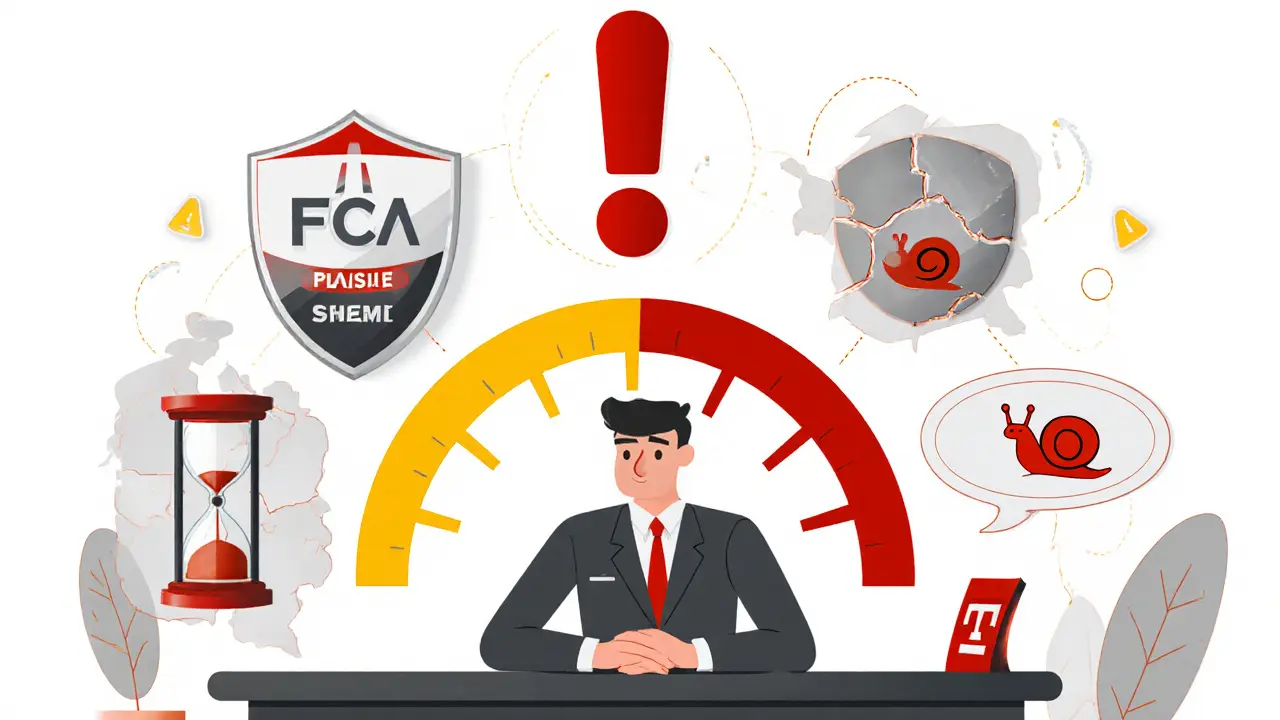LYOTRADE Risk Assessment Tool
Your Risk Assessment Results
Key Risk Factors
This LYOTRADE crypto exchange review pulls back the curtain on a platform that markets itself as a simple way to trade digital assets, but is riddled with regulatory warnings, technical hiccups, and user‑fund concerns. If you’re weighing whether to dip your toe into LYOTRADE, read on - the facts below will help you avoid costly missteps.
Quick Summary
- LYOTRADE operates from SaintVincentandtheGrenadines, a jurisdiction with minimal financial oversight.
- The UK FCA labels it an unregulated broker, meaning client funds lack statutory protection.
- Users report sluggish interface performance and frequent withdrawal delays.
- Security features lag behind major exchanges like Binance, Coinbase, and Bybit.
- For most traders, especially those handling sizable capital, safer regulated alternatives are strongly recommended.
What Is LYOTRADE?
LYOTRADE is a web‑based cryptocurrency exchange that allows buying, selling, and swapping of digital assets. It also goes by the name LioTrade on several review sites. The platform’s launch date is vague, and its corporate filings disclose only a base in SaintVincentandtheGrenadines, a jurisdiction known for limited regulatory scrutiny.
Its user interface is deliberately minimal: a handful of dropdown menus, a basic order book, and a single‑page dashboard. This stripped‑down design can feel welcoming to complete beginners, but experienced traders quickly notice the absence of advanced charting tools, API access, and margin‑trading options that are standard on larger platforms.
Regulatory Standing - The Red Flag You Can’t Ignore
Financial Conduct Authority (FCA) in the United Kingdom has publicly flagged LYOTRADE as an unregulated broker. The warning appears on the FCA’s official register and warns consumers that the platform does not meet the agency’s standards for capital adequacy, client asset segregation, or anti‑money‑laundering controls.
Because LYOTRADE is domiciled in SaintVincentandtheGrenadines, it falls outside the purview of major financial supervisors such as the U.S. Securities and Exchange Commission (SEC) or the European Securities and Markets Authority (ESMA). Consequently, there is no statutory insurance fund to reimburse users if the exchange suffers a breach or collapse.
In practical terms, this regulatory vacuum translates into a higher likelihood that user funds could be lost, frozen, or misappropriated without any legal recourse. For traders who value asset protection, the lack of licensing is a deal‑breaker.
Technical Performance and User Experience
Real‑world testing in 2025 shows that LYOTRADE’s web client suffers from noticeable latency. Order execution times frequently exceed five seconds during peak market activity, which can be costly in volatile crypto markets where price swings occur within milliseconds.
Users also report frequent “connection timeout” errors when trying to place market orders, and the platform’s charting widget refreshes only every 30seconds, lagging behind price movements on other exchanges. These technical shortcomings are likely tied to under‑invested server infrastructure and a lack of content‑delivery network (CDN) optimization.
Customer support is another pain point. The site offers a generic email form and a limited live‑chat window that appears only during business hours in the Caribbean time zone. Response times can stretch to 48hours, and the quality of assistance varies widely.

Security and Fund Safety
Security audits for LYOTRADE are sparse. The platform’s website does not publish third‑party penetration test results, nor does it disclose whether it stores user private keys in cold wallets-a standard practice among reputable exchanges.
Several user reports from 2024‑2025 describe delayed withdrawals, with some users waiting over two weeks for fiat payouts. In a handful of cases, withdrawals were reportedly rejected without clear justification, fueling accusations of potential fund freezing.
By contrast, established exchanges such as Binance and Coinbase employ multi‑signature wallets, regular third‑party security audits, and insurance programs that cover a portion of user assets in the event of a breach. LYOTRADE lacks any comparable safety net.
How Does LYOTRADE Stack Up Against the Big Players?
| Feature | LYOTRADE | Binance | Coinbase | Bybit |
|---|---|---|---|---|
| Regulatory License | None (unregulated) | Multiple (e.g., Malta, Seychelles) | US, UK, EU licences | Multiple (e.g., Seychelles) |
| Trading Pairs | ~20 major coins | >1,000 pairs | ~200 pairs | ~250 pairs |
| Advanced Tools | Basic order book only | Futures, margin, API, deep charts | Limited API, basic charts | Derivatives, API, advanced charts |
| Security Audits | None disclosed | Regular third‑party audits | Annual SOC 2 compliance | Periodic security reviews |
| Withdrawal Speed | Hours‑to‑weeks (often delayed) | Instant (crypto) - 1‑2days (fiat) | Instant (crypto) - 1‑3days (fiat) | Instant (crypto) - 1‑2days (fiat) |
| Customer Support | Email + limited chat (48‑hr response) | 24/7 live chat, phone | 24/7 chat, email, phone (US) | Live chat, ticket system |
The table makes it clear that LYOTRADE falls short on almost every critical dimension: licensing, product depth, security transparency, and support reliability.
Who Might Still Consider LYOTRADE?
Given the downsides, the platform’s niche appeal is very narrow. It could suit:
- Crypto hobbyists who want to experiment with tiny amounts (<$100) and are not worried about regulatory protection.
- Users residing in jurisdictions where major exchanges are blocked but can still access LYOTRADE’s web client.
Even in these cases, the risk‑reward balance remains skewed. A modest capital exposure does not eliminate the potential for loss through technical glitches or fund‑freezing events.
Safer Alternatives to Consider
If you want a platform that combines solid regulation, robust security, and a full suite of trading tools, look at the following:
- Binance: Offers a massive selection of coins, futures markets, and an API for algorithmic trading. Regulated in several jurisdictions and provides a SAFU insurance fund.
- Coinbase: Ideal for beginners and institutional investors alike, with clear licensing in the US, UK, and EU, plus insurance coverage for digital assets held in custody.
- Bybit: Strong derivatives offering, good liquidity, and a compliance program that meets standards in multiple regions.
All three exchanges publish regular security audit reports, maintain cold‑storage ratios above 90%, and have dedicated compliance teams.
Final Risk Assessment
Summing up, LYOTRADE’s biggest liabilities are its lack of regulatory licensing, opaque security practices, and a performance‑deficient platform. The combination of an offshore jurisdiction and an FCA warning means that, in the event of a dispute, users have limited legal avenues.
For anyone serious about protecting their crypto portfolio, the prudent move is to bypass LYOTRADE altogether and opt for a well‑established exchange that offers transparent governance, insurance safeguards, and a proven track record of reliable trade execution.

Frequently Asked Questions
Is LYOTRADE a regulated exchange?
No. The UK Financial Conduct Authority has listed LYOTRADE as an unregulated broker, and the platform operates from SaintVincentandtheGrenadines, a jurisdiction without robust financial oversight.
Can I trust my funds on LYOTRADE?
Trust is limited. The exchange does not disclose whether it uses cold wallets or undergoes third‑party security audits, and users have reported delayed withdrawals and occasional fund‑freezing incidents.
How does the trading speed compare to other exchanges?
LYOTRADE’s web client often experiences latency of 5seconds or more during peak periods, whereas major exchanges like Binance or Coinbase typically execute market orders within milliseconds.
Are there any legitimate use‑cases for LYOTRADE?
Only very low‑value, experimental trading might make sense-for example, testing a tiny amount of Bitcoin to learn the basics. Even then, users should be prepared for potential technical glitches and lack of recourse.
What alternatives should I consider?
For most traders, Binance, Coinbase, and Bybit provide better security, regulatory compliance, and a richer set of trading tools. Choose the one that aligns with your jurisdiction and trading style.



 Finance
Finance





Ayaz Mudarris
July 4, 2025 AT 15:05Having examined the LYOTRADE review, it becomes evident that the platform's lack of regulatory oversight constitutes a substantial risk factor. Moreover, the technical latency and limited security measures further diminish its suitability for serious traders. Consequently, prospective users should prioritize exchanges with robust compliance frameworks and transparent security audits.
Irene Tien MD MSc
July 8, 2025 AT 03:36Oh, the dazzling allure of LYOTRADE – a veritable circus of unregulated optimism, cloaked in the finest veneer of "simplicity". One might imagine a clandestine cabal of shadowy financiers pulling the strings behind the scenes, while you, dear trader, are handed a silver spoon of false security. The platform's sluggish performance is not merely a technical hiccup; it is a symptom of an architecture built on sand, destined to collapse under the weight of market volatility. Take, for instance, the reports of withdrawal delays that stretch into weeks – a timeline that rivals the gestation period of a blue whale. And let us not overlook the glaring absence of any third‑party security audit; it is as if the developers are playing hide‑and‑seek with accountability. The FCA's designation of LYOTRADE as an unregulated broker is not a casual footnote but a red flag flashing in neon. In the grand theatre of crypto exchanges, LYOTRADE occupies the role of the understudy who never makes it to opening night, while the audience – you – are left holding tickets to a show that never starts. If you value your capital, consider the established titans like Binance or Coinbase, whose regulatory licenses are not merely decorative plaques but shields that protect investors from rogue practices. In short, unless you enjoy the thrill of gambling with your financial future, steer clear of this digital mirage.
Vaishnavi Singh
July 11, 2025 AT 16:07Reflecting on the risk assessment, the absence of statutory protection raises philosophical concerns about trust in digital institutions. One must weigh the epistemic certainty of regulation against the allure of unfettered autonomy.
Peter Johansson
July 15, 2025 AT 04:39Hey there! 😊 If you’re dabbling in crypto, remember that peace of mind matters more than a sleek UI. A platform without solid backing can turn excitement into anxiety fast.
Cindy Hernandez
July 18, 2025 AT 17:10Summarizing the key points: LYOTRADE lacks regulatory licensing, has slower order execution, and offers limited security features. For most traders, especially those handling larger sums, it’s advisable to explore alternatives that provide insurance coverage and transparent audits.
victor white
July 22, 2025 AT 05:41One cannot help but suspect that the omission of any regulatory framework is a deliberate ploy to conceal deeper machinations. The platform’s opacity seems tailored to keep users in the dark while a hidden elite reap the benefits.
Angela Yeager
July 25, 2025 AT 18:13Thanks for the comprehensive breakdown. It’s helpful to see a side‑by‑side comparison; it makes the decision process much clearer.
Darren R.
July 29, 2025 AT 06:44We must ask ourselves whether we, as a community, wish to endorse platforms that shirk responsibility. The moral imperative is clear: support services that safeguard user assets and uphold ethical standards.
Millsaps Delaine
August 1, 2025 AT 19:15From a pragmatic standpoint, the lack of advanced trading tools on LYOTRADE renders it unsuitable for anyone beyond a casual hobbyist. The platform’s minimalistic design may appeal to beginners, yet it betrays them with hidden fees and slow withdrawals.
Jack Fans
August 5, 2025 AT 07:46Indeed, the simplicity can be a double‑edged sword; while it lowers the entry barrier, it also deprives traders of crucial functionalities-like robust API support-that are essential for scaling strategies.
Krithika Natarajan
August 8, 2025 AT 20:18Safety should always come first.
Rebecca Stowe
August 12, 2025 AT 08:49Stay positive and keep learning; the right platform will support your growth.
Aditya Raj Gontia
August 15, 2025 AT 21:20Sounds like a risky venture.
Kailey Shelton
August 19, 2025 AT 09:52Not impressed.
vipin kumar
August 22, 2025 AT 22:23Behind the façade of "crypto freedom" lies a sprawling network of hidden actors funneling data to undisclosed entities, a pattern that mirrors historical attempts at financial manipulation.
Mark Briggs
August 26, 2025 AT 10:54Sure, if you like losing money fast.
mannu kumar rajpoot
August 29, 2025 AT 23:26The narrative presented by these platforms often masks a deeper agenda, steering users toward inevitable loss while projecting an illusion of autonomy.
Tilly Fluf
September 2, 2025 AT 11:57I appreciate the thorough analysis; maintaining a formal tone underscores the seriousness of these considerations.
Hardik Kanzariya
September 6, 2025 AT 00:28Absolutely! It's vital to stay vigilant and choose services that prioritize user protection.
Shanthan Jogavajjala
September 9, 2025 AT 12:59From a technical perspective, the platform's architecture exhibits sub‑optimal throughput, making it ill‑suited for high‑frequency trading environments.
Adetoyese Oluyomi-Deji Olugunna
September 13, 2025 AT 01:31While the prose may appear polished, the underlying deficiencies in regulatory compliance and infrastructure render LYOTRADE a precarious choice for discerning investors.
kishan kumar
September 16, 2025 AT 14:02In conclusion, the prudent course of action is to align with exchanges that demonstrate transparency, resilience, and regulatory integrity. 😊
Anthony R
September 20, 2025 AT 02:33Indeed; the evidence aligns with the recommendation for more reputable platforms; therefore, users should reevaluate their options; thank you.
Linda Welch
September 23, 2025 AT 15:05It’s infuriating to see yet another foreign platform trying to infiltrate the market while ignoring American standards; we deserve better and must hold these entities accountable. The lack of oversight is a direct threat to our financial sovereignty, and allowing such exchanges to operate unchallenged is tantamount to surrendering our economic freedom. Our regulators should step up, and investors need to prioritize home‑grown, transparent services that respect our laws.